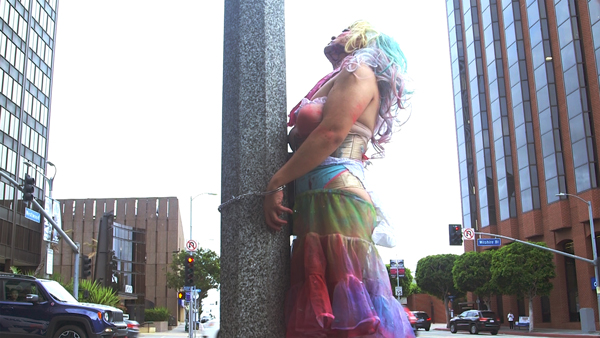On the evening of June 25, 2016, a group of gorgeous mutants rushed out of The Broad museum and began loving themselves and each other on South Grand Avenue. This band of performers, known collectively as Mutant Salon, is run by the LA-based visionary artist Young Joon Kwak. The collective had assembled at the beginning of the evening inside the Broad’s tiny Oculus Hall, as a part of the summer Happening series. But Kwak and her renegades could not abide by their confinement. Mutant Salon streamed out of the dark, broody Oculus, dashed through the museum’s blue-chip galleries, and ran into the lamplit dazzle of Downtown LA. Wearing little more than makeup, gold boots, wedding veils and bikini tops, the seraphs charged around the entrance of Eli Broad’s luxury spaceship, engaged in a performance that they called “We Make Each Other Beautiful.”
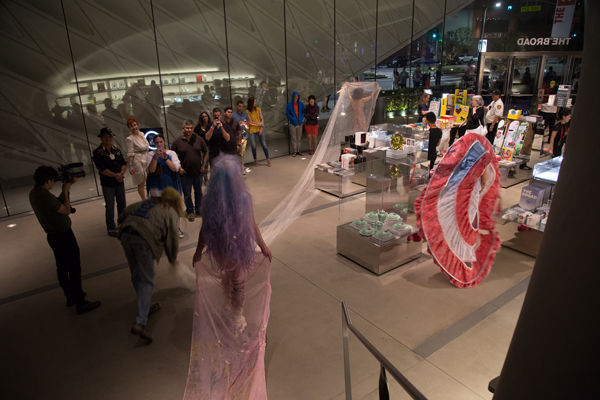
Free Mutant Salon: We Make Each Other Beautiful, 2016. Performance at The Broad, photo by Barak Zemer.
“[Working with the Broad] was a learning experience for us,” explained Kwak, who is not only Mutant Salon’s co-organizer (with Marvin Astorga, Sarah Gail Armstrong, Project Rage Queen, and Alli Miller), but also its founder. A Korean-American trans performance artist, rock star and ceramicist, Kwak chatted about the Salon and the rest of her work on a recent Monday afternoon in her Eagle Rock studio, while also allowing a visitor to cuddle her biomorphic sculptures, epoxy paintings and 14-year-old Yorkie named Ms. Tina. Wearing a bronze necklace in the pussy-friendly shape of Baubo, the Greek goddess Demeter’s jester, as well as a fetching military jacket with the words “Rest In Power” embroidered on the back, she described the cognitive dissonance of installing Mutant Salon at the Broad, a site of extreme cultural power and seemingly endless money.
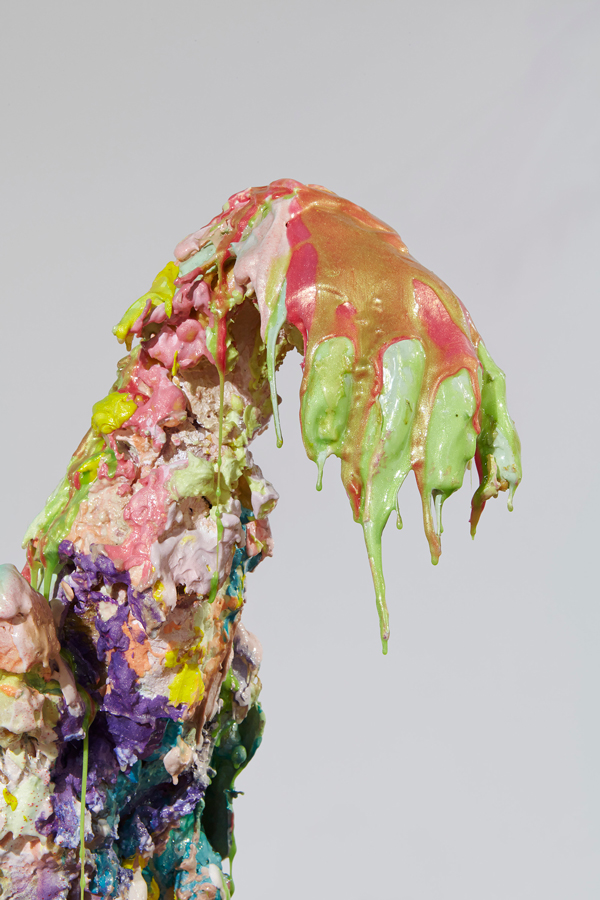
Young Joon Kwak, Mutating Stakes (detail view), 2014; Steel, pigmented plaster, resin, found objects; dimensions variable, photo by Heather Rasmussen, Courtesy of the Artist and Commonwealth & Council.
When contemplating Mutant Salon’s election to transgress the borders of the Broad and move into the city streets, it’s critical to remember, “how important [our] community is to the project,” Kwak said, specifying that she works with queer, trans, woman and “POC” [people of color] folks. “We didn’t know that [the Broad’s Happening] would be a $35 event, and that stings, because a lot of us are poor, so we just wanted to make sure the people in our community would be able to come out and participate. We didn’t just want to have the Salon in the Oculus, which is a weird anus of the museum. We wanted to put on the performance for free, too.”
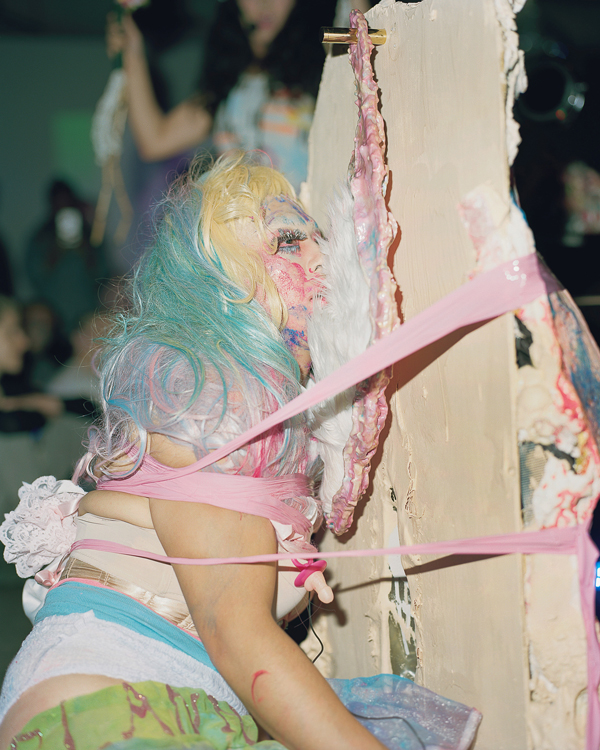
Where I Am My Own Other, Where My Mother Is Me, 2016, detail of live performance collaboration with Kim Ye at the Hammer; photo by Christopher Richmond.
Kwak, who just won a Rema Hort Mann Foundation grant and is represented by Commonwealth and Council, initiated Mutant Salon as an itinerant piece of relational and performance art. Mutant Salon is a moveable beauty salon, filled with comfy chairs, dress-up clothes, makeup, soothing unguents, handmade porcelain combs. It is enlivened by a changing cast of performers who interact with each other while applying mascara, donning merkins or braiding their hair in a protest-cum-love-in that exorcises the oppressions of mainstream beauty standards.
The Salon had its genesis in 2012, when Kwak moved to Los Angeles from Chicago to attend USC’s Roski School of Art and Design. Born in Queens, NY, in 1984, and educated in Chicago, Kwak rented an apartment on Olympic and Vermont, but did not feel “safe to get dressed and do makeup” around that area. She began to use her USC studio for self-care, and in the process discovered that she was creating a “safe space” for liberatory dressing. Friends and acquaintances began dropping by and participating, and thus the first stages of Mutant Salon were born.
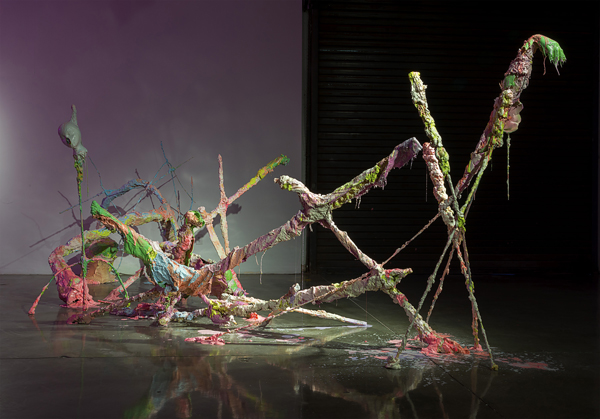
Mutating Stakes, 2014, steel, pigmented plaster, resin, found objects; dimensions variable, photo by Josh White.
The frontier-crossing “mutant,” whom Kwak defines as a person who is “mutable, transformative and hybrid,” is an apt icon for Kwak’s larger oeuvre, which has long challenged binary gender and thinking by adapting materials and ideas into unexpected forms.
In 2010, after receiving her BFA from the School of the Art Institute of Chicago, and a Humanities MA at the University of Chicago, she combined the elements of yoga, oil, fire, emotional submission, resurrection and ornithology to make (with Anneka Herre) the video Transgenesis II: Dead of Dawn, in which she is cast as an oil-drowned baby bird who is washed clean by a loving if over-controlling mommy. Kwak’s gifts for transformation later found expression in 2013’s Excreted Venus, a photograph that shows her bound, doused in potter’s clay, and posed (it seems to this observer) like the goddess Lakshmi. Was this sculpture? Performance? Her challenges to art categories continued with her handcrafts—as in 2014’s Mutating Stakes, multi-colored and drippingly anthropomorphic painted sculptures made out of steel, plaster, silicone rubber body molds, a wig head, epoxy resin and facial cosmetics. Then in October, 2017, she put on a performance, with Kim Ye, titled Where I Am My Own Other, Where My Mother Is Me, wherein another loving but disturbing mother-lover figure feeds Kwak’s persona a large, deeply pigmented pink cake, which later gets smeared all around her body and onto the floor, in a gesture that seems related to Jackson Pollock’s action paintings as well as Ana Mendieta’s Untitled (Blood Sign #2/Body Tracks) (1979).
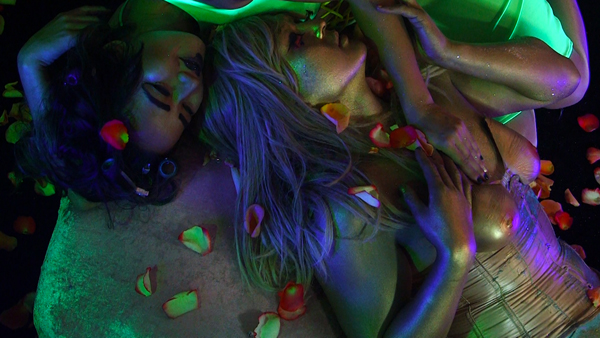
Young Joon Kwak & Kim Ye, Where I Am My Own Other, Where My Mother Is Me, 2017; video still, 15 min. 3 sec.
Performance is where Kwak brings her mixed mediums and her message of unity most intimately together. Her life as a rock star began with Xina Xurner, the initially Chicago-based band that she started with her partner, Marvin Astorga, in 2011. Xina Xurner, whose name plays on the specter of the diva-hero Tina Turner, set out to deliver “cunty noise-diva-dance anthems that ooze sex, death and decay.” It got its start in underground Windy City clubs, which Kwak notes were most noteworthy for a “punk scene which is also noise-bro-dominated,” but which quickly made space for Xina Xurner’s music. “It was like, we’re doing it for Chicago!” Kwak exclaimed in her studio, describing how the audience would dance and identify along. As Xina Xurner, Kwak wore evening gowns and paraded glorious grooming, and also morphed her voice with the aid of transformers. “I can shift my voice from sounding like a woman to sounding like a little baby, or go really deep, like a man, or more robotic—it’s vocal drag vocal mutation,” she explained, while fiddling with her computer, which soon began emitting operatic disco tunes.
Mutant Salon developed in tandem with Xina Xurner and shares its ethos of civic chaos and love. (As Kwak played songs from Xina’s upcoming album, Queens of the Night, she sang to her interviewer, who began dancing in the studio along with Ms. Tina.) “There’s a lot of dress up and costume [in my work],” Kwak laughed, bouncing to the music. “And we can be covered in trash and look like monsters, but we’re still beautiful, because we make each other beautiful.” She paused for a second, and grew thoughtful, as the February winter light made her Baubo necklace sparkle. “There’s an idea that my friend Gordon Hall—an artist and writer—taught me about. Gordon has this idea about what he calls reparative objectification. We look at each other as objects in profound affirmation, and kind of apart from how objectification is typically dehumanizing. We twist that into something reparative, affirming.” She smiled as Queens of the Night blasted through the studio. “I want the work to be inviting and welcoming, you know? It’s about finding that balance of strangeness, and the ugly, and the monstrous, and the messy.”
EXCLUSIVE Premiere of Xina Xurner’s New Music Video, Gentle.
Gentle is a track from the second full length LP Queens Of The Night, by Xina Xurner (collaboration between Los Angeles-based artist/performer Young Joon Kwak & musician Marvin Astorga), released in April of 2018. Queens Of The Night is a battlecry for the femme destruction of the patriarchy through collective resistance, rage, affirmation, and transformation.
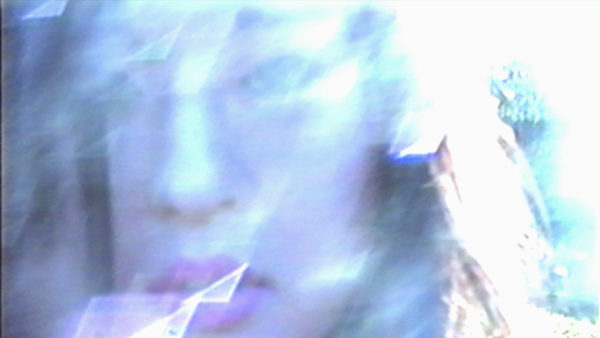
Mutating Stakes, 2014, steel, pigmented plaster, resin, found objects; dimensions variable

